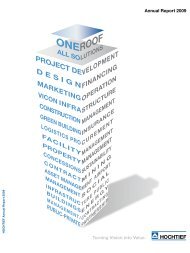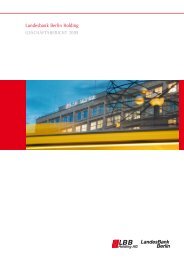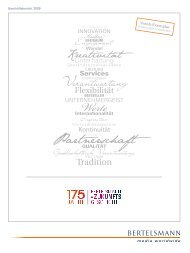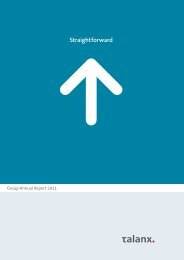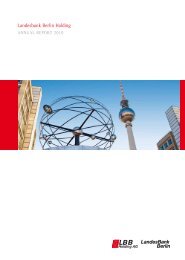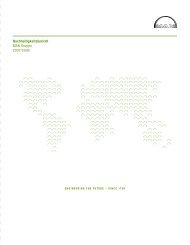Values
Values
Values
Create successful ePaper yourself
Turn your PDF publications into a flip-book with our unique Google optimized e-Paper software.
Company | Group Management | Group Financial | Corporate Governance | Report of the | Boards/Mandates | Additional Information<br />
Report Statements Supervisory<br />
Board<br />
Th e ICS for the accounting process consists of the following<br />
areas: Th e Group’s internal rules for accounting and<br />
the preparation of fi nancial statements are made available<br />
without delay to all employees involved in the accounting<br />
process. Th e consolidated fi nancial statements are prepared<br />
in a reporting system that is uniform throughout the Group.<br />
Automatic system controls ensure the consistency of the data<br />
in the fi nancial statements. Systematized processes for coordinating<br />
intercompany business operations serve to prepare<br />
the corresponding consolidation steps. Circumstances that<br />
could lead to signifi cant misinformation in the consolidated<br />
fi nancial statements are monitored centrally by employees of<br />
Bertelsmann AG and by RTL Group then verifi ed by external<br />
experts as required. Central contact persons from Bertelsmann<br />
AG and the divisions are also in continuous contact with the<br />
local subsidiaries to ensure IFRS-compliant representation of<br />
matters that are material to the Group and compliance with<br />
reporting deadlines and obligations. Th ese preventive measures<br />
are rounded off by controls in the form of analyses by<br />
Bertelsmann AG’s Corporate Consolidation department and<br />
RTL Group whose purpose is to quickly uncover Group-level<br />
misrepresentations in the fi nancial statements. Th e further<br />
aim in introducing a globally binding control framework for<br />
the decentralized accounting processes by the end of 2010 is<br />
to achieve a standardized ICS format at the level of the local<br />
accounting departments of all fully consolidated Group companies.<br />
A standardized questionnaire was used throughout the<br />
Group to obtain a snapshot of the quality of the ICS in the key<br />
Group companies as part of a self-assessment conducted at<br />
the time of the 2009 annual fi nancial statements. Th e fi ndings<br />
were discussed in Audit and Finance Committee meetings at<br />
the divisional level.<br />
Corporate Audit evaluates the accounting-related processes<br />
in the course of its auditing activities. As part of their work,<br />
auditors are also required to report to the Audit and Finance<br />
Committee of the Supervisory Board any signifi cant vulnerabilities<br />
of the internal control and risk management system<br />
relating to the accounting process that they identify in the<br />
course of their audit.<br />
Bertelsmann Annual Report 2009<br />
Signifi cant Risks<br />
Th e following signifi cant risks for Bertelsmann were identifi ed<br />
in the course of risk reporting:<br />
Financial Market Risks<br />
Bertelsmann is exposed to various forms of fi nancial risk. Th ese<br />
include interest rate and currency risks in particular. Th ese<br />
risks are largely controlled centrally by Corporate Treasury<br />
on the basis of guidelines established by the Executive Board.<br />
Derivative fi nancial instruments are used solely for hedging<br />
purposes. Bertelsmann uses currency derivatives mainly to<br />
hedge recorded and future transactions involving foreign currency<br />
risk. Some fi rm commitments denominated in foreign<br />
currency are partially hedged when they are made, with the<br />
hedged amount increasing over time. A number of subsidiaries<br />
are based outside the euro zone. Th e resulting translation risk<br />
is managed based on economic debt in relation to operating<br />
EBITDA (leverage factor). Bertelsmann’s long-term focus is on<br />
the maximum leverage factor permitted for the Group. Foreign<br />
currency translation risks arising from net investments in foreign<br />
entities are not hedged. Interest rate derivatives are used<br />
centrally for the balanced management of interest rate risk. Th e<br />
maturity structure of interest-bearing debt is managed on two<br />
levels: by selecting appropriate fi xed interest rate periods for the<br />
originated fi nancial assets and liabilities aff ecting liquidity, and<br />
through the use of interest rate derivatives. Th e liquidity risk<br />
is regularly managed and monitored on the basis of the planning<br />
calculation. Lines of credit at banks as well as appropriate<br />
liquidity provisions form a suffi cient risk buff er for unplanned<br />
payments. Counterparty risks exist in the Group in invested<br />
cash and cash equivalents and in the default of a counterparty<br />
in derivatives transactions. Financial transactions and fi nancial<br />
instruments are restricted to a fi rmly defi ned group of banks<br />
with an excellent credit rating. Against the background of the<br />
economic crisis, Bertelsmann has extended its internal guidelines<br />
on investment of cash and cash equivalents. Some of the<br />
investments are made on a very short-term basis so that the<br />
investment volume can be reduced if the credit rating changes<br />
(see also further explanatory remarks on “Risk Management”<br />
in section 26 of the “Notes”).<br />
73



